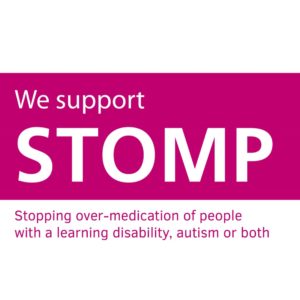STOMP project – D’s story

The letter below was written by the mother of service user ‘D’ to NTW’s STOMP clinic at the Newcastle Community Team Learning Disability (CTLD), including NTW pharmacist Sanjay Gohil. The clinic aims to stop the over-medication of people with a learning disability, autism or both, as part of NHS England’s national STOMP project.
D and I have been supported by Sanjay since September.This is D’s second experience of the use of medication and the two could not be more different.
The first was fifteen years ago and traumatic – I don’t use this word lightly. He was prescribed a medication which did not suit him and resulted in horrendous side effects including severe sedation, weight gain, restlessness, increased anxiety – I could go on.
This time round the use of medication has resulted in a major turnaround in D’s mental health and as a consequence his quality of life. This is in no small part due to the involvement of Sanjay, as part of the team that has been supporting us.
Sanjay attended the first meeting to discuss medication as part of a plan to improve D’s mental health. I desperately wanted D to make a recovery but because of his past experience with medication was concerned about its use again.
Sanjay was able to explain the reason for the chosen medication and why it was likely to best suit D. He answered all my initial questions, and there were many! Some of them were just about the practicality of administering the medication: was it available in liquid form, what did it taste like etc.
Sanjay provided information about the medication in an accessible format, explained possible side effects in layman’s terms – I had no idea what QTc prolongation was – and how I could monitor and record any changes. Sanjay confirmed with the PBS team their involvement and his hope that medication would be a temporary intervention.
Despite starting D on a low dose he started to show unpleasant side effects. Sanjay explained that the side effects are often noticeable before the benefits of the medication. Because I trusted him and his advice, I stuck with it. A week later, I had a wobble and wanted to stop the medication but again Sanjay was supportive and encouraged me to stick with it, helping to tweak the dose (a reduction not an increase) and also when the medication was taken.
Three months later the change in my boy is amazing. He is able to enjoy the same community activities and many more without the background noise of his anxiety. The highlight of our year has been a visit to the Fenwick Christmas window and Christmas Market in the city centre during the day. D asked to buy a bratwurst, sat down to eat it and people watched. An outstanding feat for D.
It’s common sense really that a pharmacist should be part of a team that is involved when medication is considered, already prescribed, reviewed, etc. If D had a broken leg, I would expect the team to include everybody with a specialism, not just the person who fixed the leg but the OT and physio, etc as well. Medication is a pharmacist’s specialism! Sanjay’s input has been instrumental in D’s recovery.
I am grateful and feel very fortunate that second time round D’s crisis occurred in an area and during a period when the STOMP programme is high on the agenda.
D’s story has a happy ending. He received timely, person centred, community based support without the need for an inpatient admission. This example of good practice must be everybody’s experience regardless of where they live.
